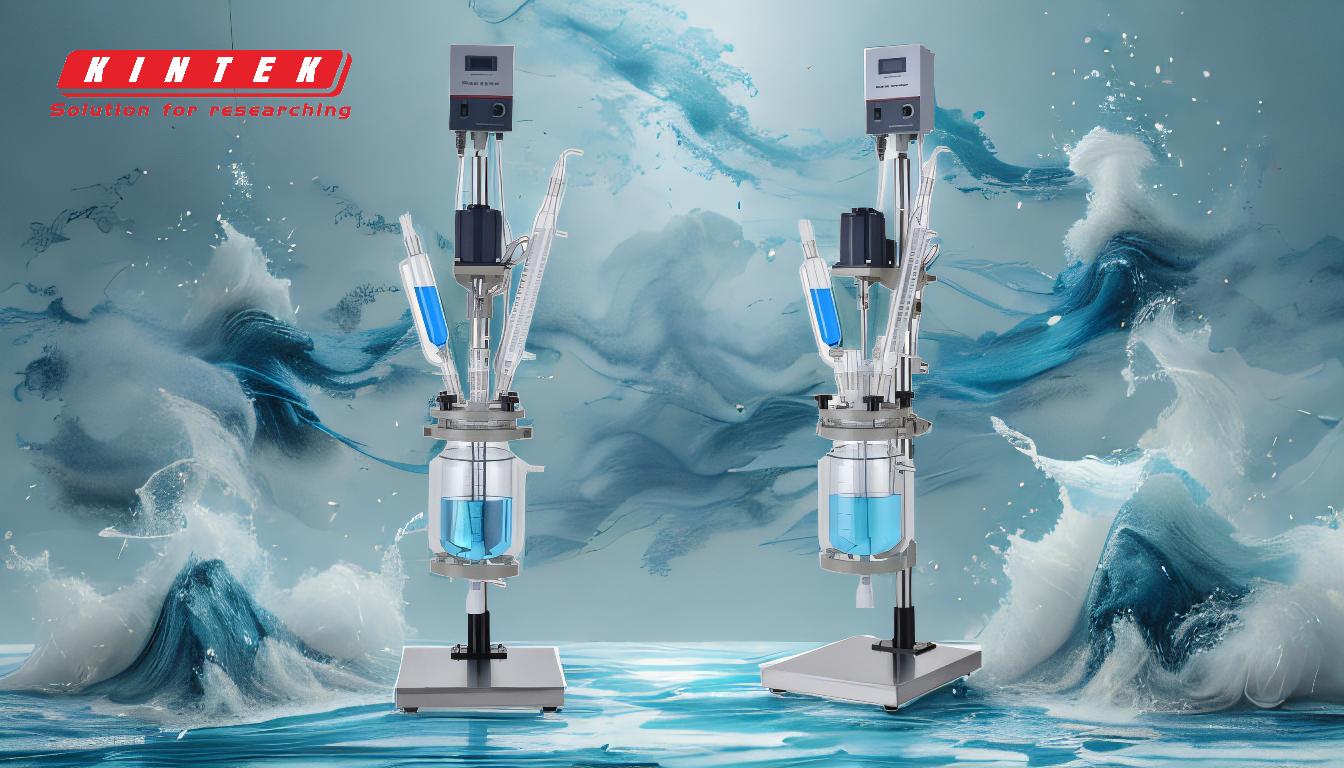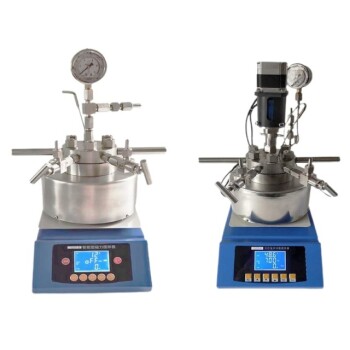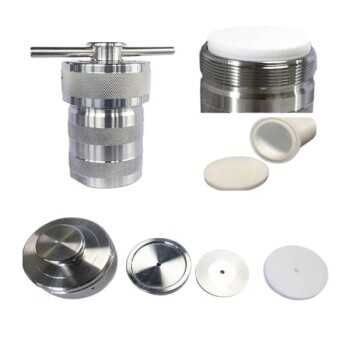Laboratory reactors are essential tools in chemical research and development, designed to facilitate a wide range of reactions under controlled conditions. The types of laboratory reactors vary based on their design, operation, and specific applications. Common types include stirred reactors, high-pressure reactors, mini reactors, continuous flow tubular reactors, and custom configurations tailored for specialized research like biofuels. Additionally, reactors can be categorized based on their construction materials (e.g., glass-lined reactors) and heating methods (e.g., electric heating or steam reactors). The choice of reactor depends on factors such as reaction type, flow rate, temperature, pressure, and volume requirements.
Key Points Explained:

-
Stirred Reactors:
- Stirred reactors are widely used in laboratories for mixing and homogenizing reactants.
- They typically consist of a vessel with an agitator or stirrer to ensure uniform mixing and heat distribution.
- Applications include polymerization, crystallization, and other reactions requiring consistent mixing.
-
High-Pressure Reactors:
- These reactors are designed to handle reactions that occur under high-pressure conditions.
- They are often used in processes like hydrocracking, hydrogenation, and supercritical fluid reactions.
- High-pressure reactors are constructed with robust materials to withstand extreme conditions.
-
Mini Reactors:
- Mini reactors are small-scale versions of larger reactors, ideal for preliminary testing and optimization of reactions.
- They are cost-effective and require minimal amounts of reactants, making them suitable for high-throughput screening and research.
-
Continuous Flow Tubular Reactors:
- These reactors operate in a continuous flow mode, where reactants flow through a tubular system.
- They can be externally heated or jacketed with a circulating fluid to maintain precise temperature control.
- Ideal for reactions requiring steady-state conditions and scalable processes.
-
Custom Configurations:
- Custom reactors are designed for specific research needs, such as biofuels development.
- They may include specialized features like unique heating methods, pressure controls, or material compatibility.
- These reactors are tailored to meet the exact requirements of niche applications.
-
Glass-Lined Reactors:
- Glass-lined reactors are used for reactions involving corrosive substances.
- The glass lining provides resistance to chemical attack, ensuring the integrity of the reactor.
- Commonly used in pharmaceutical and fine chemical industries.
-
Hydrothermal Synthesis Reactors:
- These reactors are used for reactions that require high temperatures and pressures, often in aqueous solutions.
- Applications include the synthesis of nanomaterials and inorganic compounds.
-
Magnetic Stirring Reactors:
- Magnetic stirring reactors use a magnetic stirrer to mix reactants without mechanical agitation.
- They are suitable for small-scale reactions and offer easy cleaning and maintenance.
-
Electric Heating Reactors:
- Electric heating reactors use electric elements to provide precise and consistent heating.
- They are ideal for reactions requiring controlled temperature profiles.
-
Steam Reactors:
- Steam reactors utilize steam as a heating medium, often for large-scale or industrial applications.
- They are efficient for processes requiring high heat transfer rates.
-
Plug Flow Reactors (PFR):
- PFRs are tubular reactors where reactants flow as a "plug" with minimal mixing.
- They are used for reactions requiring precise control over residence time and reaction kinetics.
-
Continuous Stirred-Tank Reactors (CSTR):
- CSTRs are continuously operated reactors with constant stirring to maintain uniform conditions.
- They are ideal for reactions requiring steady-state operation and consistent product quality.
-
Loop Reactors:
- Loop reactors circulate reactants through a loop system, providing efficient mixing and heat transfer.
- They are used in processes like gas-liquid reactions and polymerization.
-
Batch Reactors:
- Batch reactors operate in discrete batches, where reactants are added, reacted, and then removed.
- They are versatile and suitable for small-scale or multi-product operations.
-
Catalytic Reactors:
- Catalytic reactors are designed to facilitate reactions using catalysts.
- They are used in processes like hydrogenation, oxidation, and catalytic cracking.
-
Semi-Batch Reactors:
- Semi-batch reactors combine features of batch and continuous reactors, allowing for controlled addition of reactants.
- They are used in reactions requiring gradual reactant addition or temperature control.
By understanding the different types of laboratory reactors, researchers can select the most appropriate reactor for their specific needs, ensuring optimal reaction conditions and outcomes.
Summary Table:
| Type of Reactor | Key Features | Applications |
|---|---|---|
| Stirred Reactors | Uniform mixing, heat distribution, agitator/stirrer | Polymerization, crystallization, consistent mixing |
| High-Pressure Reactors | Robust materials, high-pressure handling | Hydrocracking, hydrogenation, supercritical fluid reactions |
| Mini Reactors | Small-scale, cost-effective, minimal reactants | High-throughput screening, preliminary testing |
| Continuous Flow Tubular | Continuous flow, precise temperature control | Steady-state conditions, scalable processes |
| Custom Configurations | Tailored design, specialized features | Biofuels development, niche applications |
| Glass-Lined Reactors | Corrosion-resistant, glass lining | Pharmaceutical, fine chemical industries |
| Hydrothermal Synthesis | High temperature/pressure, aqueous solutions | Nanomaterial synthesis, inorganic compounds |
| Magnetic Stirring | Magnetic stirrer, easy cleaning | Small-scale reactions, minimal maintenance |
| Electric Heating | Precise heating, electric elements | Controlled temperature profiles |
| Steam Reactors | Steam heating, high heat transfer rates | Large-scale, industrial applications |
| Plug Flow Reactors (PFR) | Minimal mixing, precise control over residence time | Reaction kinetics, precise control |
| Continuous Stirred-Tank (CSTR) | Constant stirring, uniform conditions | Steady-state operation, consistent product quality |
| Loop Reactors | Efficient mixing, heat transfer, loop circulation | Gas-liquid reactions, polymerization |
| Batch Reactors | Discrete batches, versatile | Small-scale, multi-product operations |
| Catalytic Reactors | Catalyst-based reactions | Hydrogenation, oxidation, catalytic cracking |
| Semi-Batch Reactors | Controlled reactant addition, temperature control | Gradual reactant addition, temperature-sensitive reactions |
Need help selecting the right laboratory reactor for your research? Contact our experts today for personalized guidance!


